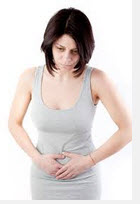Ovarian Cysts: What Symptoms Should You Be Looking For?
It's not easy to know whether you have ovarian cysts!
You can have cysts without any symptoms at all, or you may have vague abdominal symptoms that could suggest a number of health problems that are completely unrelated.
Free PCOS Newsletter
The Most Likely Symptoms
In general, one or more of the following symptoms may be present:
- Menstrual irregularities.
- Pelvic pain
- A dull ache, either constant or intermittent, possibly radiating to the low back or thighs.
- Pelvic pain during intercourse.
- Pelvic pain just before your period begins or just after it ends.
- A fullness or heaviness in your abdomen.
- Feeling of pressure on your bladder or rectum.
- Nausea or breast tenderness similar to when you?re pregnant.
- Continuous, creamy or clear-like-egg-white vaginal discharge that persists unchanged for a month or more
- Painful bowel movements
Any of these symptoms are enough reason to consult with your doctor.
These cysts may be one aspect of a hormonal and metabolic disorder called PCOS. However, there are some differences in symptoms between the two disorders. You can see a list of PCOS symptoms here.
Symptoms that Might Be Something Else

There are a number of signs and symptoms that may cause you to think you have painful ovarian cysts but are actually something else. You may be experience another health issue that requires attention.
For example, you might have an abdominal condition such as:
- Appendicitis
- Diverticulitis
- Intestinal inflammation
- Intestinal obstruction
- Gall bladder disease
- Kidney stone
- Bladder infection.
Or, you could have related or unrelated gynecologic problems such as:
- Pelvic inflammatory disease
- Endometriosis
- Ectopic or tubal pregnancy
- Mittleschmirtz, the pain some women feel at mid-cycle, after normal ovulation
- PCOS
- Ovarian cancer.
Ruptured Ovarian Cysts
Please note: If you have sudden, severe or spasmodic pain in your lower abdomen, especially if accompanied by fever, vomiting, or signs of shock (cold, clammy skin, rapid breathing, weakness), go immediately to the emergency room of the nearest hospital. You may have a large burst cyst or some other important problem.
A ruptured cyst is a fairly common phenomenon. You may not experience any symptoms, or you could have the feeling acute abdominal pain.
If you're menstruating, it's normal to have the rupture of a follicular cyst every cycle, which is either asymptomatic or with mild transient pain (mittelschmerz). In the worst case, a ruptured cyst could lead to internal bleeding and a lot of pain. Your doctor may decide to do exploratory surgery, if indicated.
Related Articles
- Ovarian Cyst Main Page
- Discover the 5 Types of Cysts
- How Are They Diagnosed or Treated?
- Prevention and Alternative Treatment
Get Answers to your Questions about
- Fertility
- Weight Control
- Hair Loss
- Stress
- Unwanted Hair
- Acne...and more!
FREE PCOS Report
and Newsletter

Your email is safe with us. We respect your privacy, and you may unsubscribe at any time.
Recent Articles
-
PCOS Long Journey to The Happy End
Apr 30, 18 07:24 PM
Hi Girls, Maybe my story will have one day a good end but I am not there yet. Until I was 31 years old I lived my dream, having lovely husband, good -
PCOS and Miscarriage
Apr 17, 18 04:03 PM
Proper diet and natural supplements can help the body maintain a pregnancy through successful delivery.
-
How to Deal with PCOS and Stress
Apr 04, 18 04:19 PM
Your body has a natural capacity to heal itself if you provide it with the necessary tools.





